Operations and Project Management: A TESCO Case Study and Analysis
VerifiedAdded on 2020/10/22
|19
|5965
|179
Report
AI Summary
This report provides a comprehensive analysis of TESCO's operations and project management practices. It begins with an introduction to operations management principles and their application within TESCO, a major British supermarket retailer. The report conducts a detailed review and critique of the implementation of these principles, including Total Quality Management, Just-in-Time, Taylor's Theory, flexible specialization, lean production, mass customization, and agile manufacturing. It also examines principles of operation management by Randall Schaeffer. Furthermore, the report explores the use of Six Sigma and Lean principles within TESCO. The study then moves on to prepare a continuous improvement plan based on the review and critique. Finally, it assesses the effectiveness of the Project Life Cycle (PLC) in a given project, supported by relevant documentation, and critically evaluates its effectiveness using appropriate theories, concepts, and models. The conclusion summarizes the key findings and insights derived from the analysis.
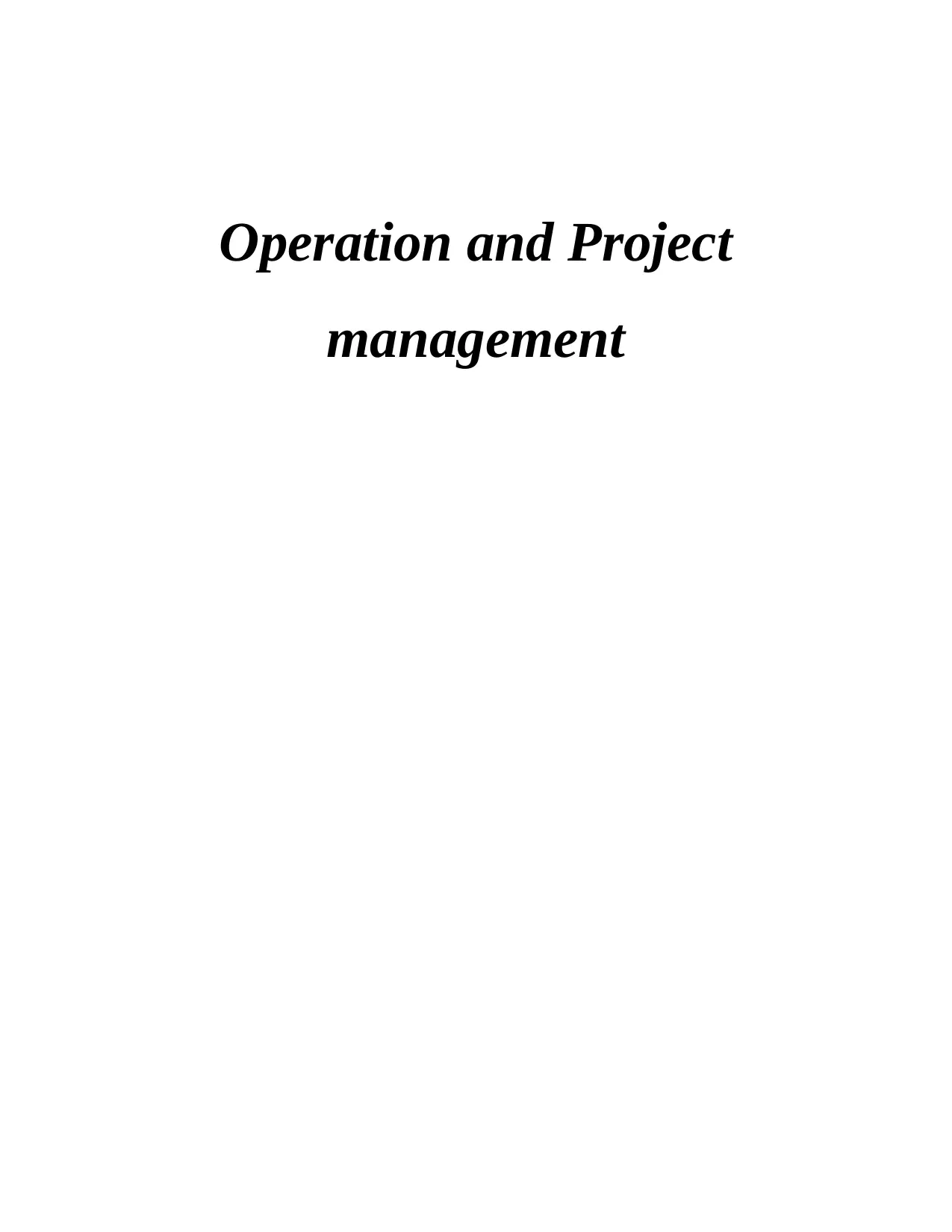
Operation and Project
management
management
Paraphrase This Document
Need a fresh take? Get an instant paraphrase of this document with our AI Paraphraser
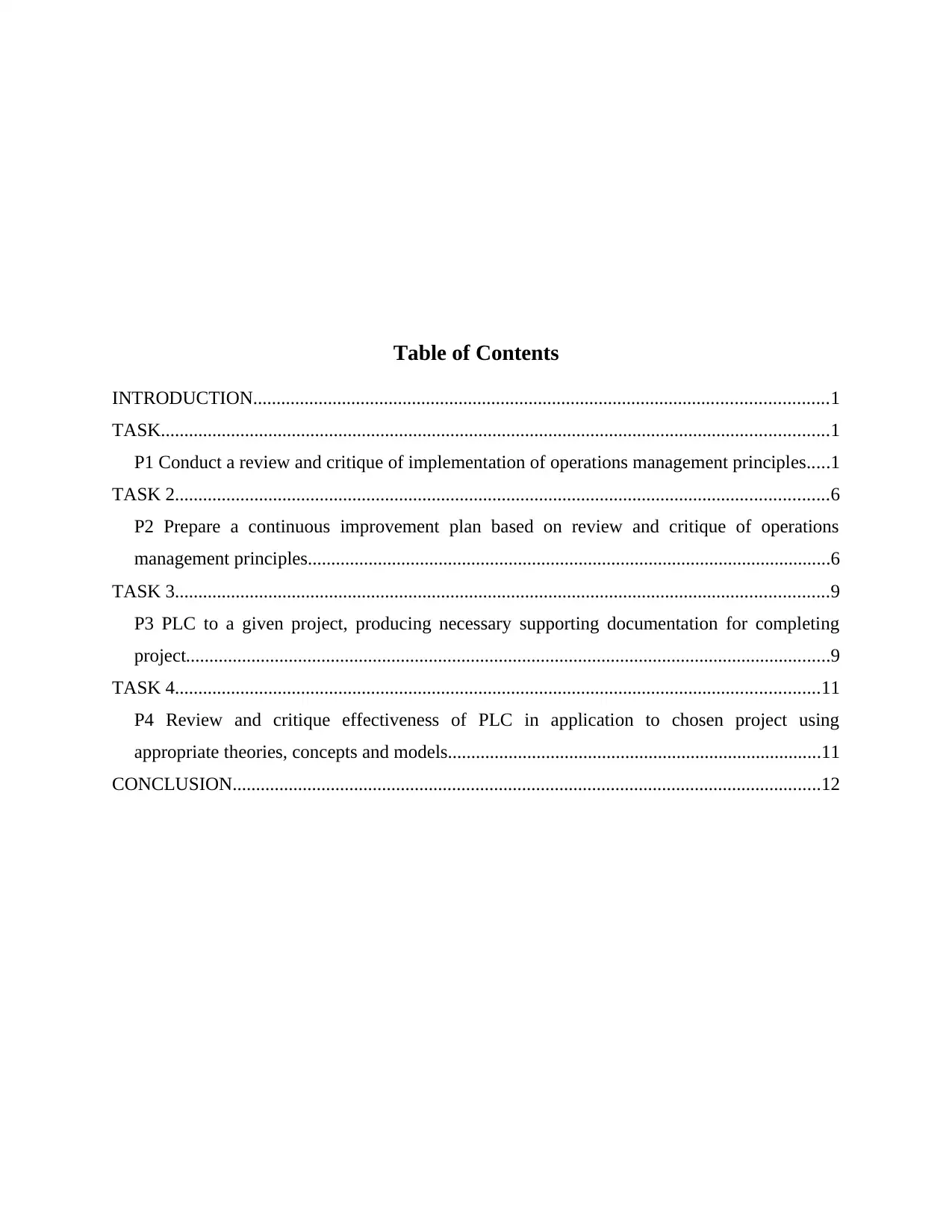
Table of Contents
INTRODUCTION...........................................................................................................................1
TASK...............................................................................................................................................1
P1 Conduct a review and critique of implementation of operations management principles.....1
TASK 2............................................................................................................................................6
P2 Prepare a continuous improvement plan based on review and critique of operations
management principles................................................................................................................6
TASK 3............................................................................................................................................9
P3 PLC to a given project, producing necessary supporting documentation for completing
project..........................................................................................................................................9
TASK 4..........................................................................................................................................11
P4 Review and critique effectiveness of PLC in application to chosen project using
appropriate theories, concepts and models................................................................................11
CONCLUSION..............................................................................................................................12
INTRODUCTION...........................................................................................................................1
TASK...............................................................................................................................................1
P1 Conduct a review and critique of implementation of operations management principles.....1
TASK 2............................................................................................................................................6
P2 Prepare a continuous improvement plan based on review and critique of operations
management principles................................................................................................................6
TASK 3............................................................................................................................................9
P3 PLC to a given project, producing necessary supporting documentation for completing
project..........................................................................................................................................9
TASK 4..........................................................................................................................................11
P4 Review and critique effectiveness of PLC in application to chosen project using
appropriate theories, concepts and models................................................................................11
CONCLUSION..............................................................................................................................12
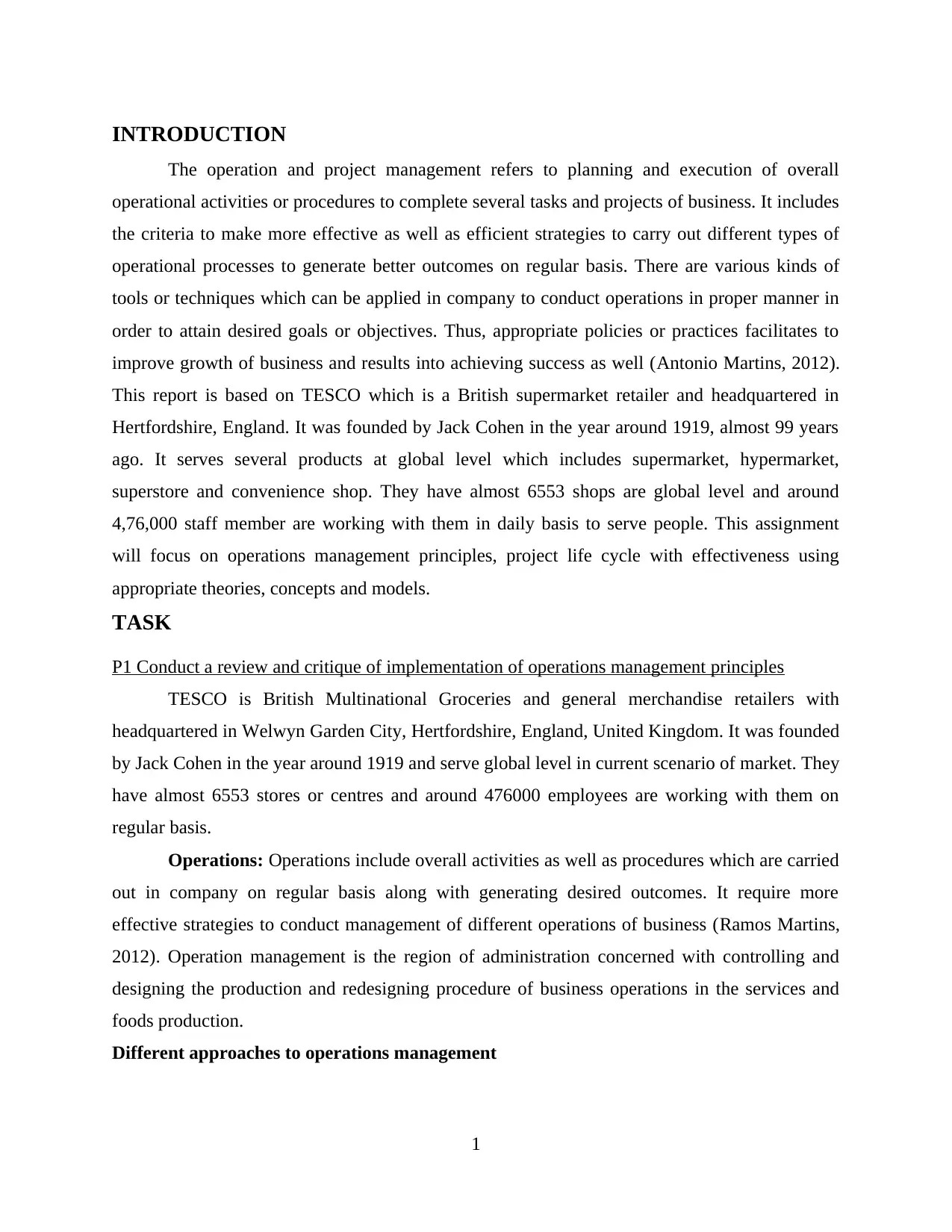
INTRODUCTION
The operation and project management refers to planning and execution of overall
operational activities or procedures to complete several tasks and projects of business. It includes
the criteria to make more effective as well as efficient strategies to carry out different types of
operational processes to generate better outcomes on regular basis. There are various kinds of
tools or techniques which can be applied in company to conduct operations in proper manner in
order to attain desired goals or objectives. Thus, appropriate policies or practices facilitates to
improve growth of business and results into achieving success as well (Antonio Martins, 2012).
This report is based on TESCO which is a British supermarket retailer and headquartered in
Hertfordshire, England. It was founded by Jack Cohen in the year around 1919, almost 99 years
ago. It serves several products at global level which includes supermarket, hypermarket,
superstore and convenience shop. They have almost 6553 shops are global level and around
4,76,000 staff member are working with them in daily basis to serve people. This assignment
will focus on operations management principles, project life cycle with effectiveness using
appropriate theories, concepts and models.
TASK
P1 Conduct a review and critique of implementation of operations management principles
TESCO is British Multinational Groceries and general merchandise retailers with
headquartered in Welwyn Garden City, Hertfordshire, England, United Kingdom. It was founded
by Jack Cohen in the year around 1919 and serve global level in current scenario of market. They
have almost 6553 stores or centres and around 476000 employees are working with them on
regular basis.
Operations: Operations include overall activities as well as procedures which are carried
out in company on regular basis along with generating desired outcomes. It require more
effective strategies to conduct management of different operations of business (Ramos Martins,
2012). Operation management is the region of administration concerned with controlling and
designing the production and redesigning procedure of business operations in the services and
foods production.
Different approaches to operations management
1
The operation and project management refers to planning and execution of overall
operational activities or procedures to complete several tasks and projects of business. It includes
the criteria to make more effective as well as efficient strategies to carry out different types of
operational processes to generate better outcomes on regular basis. There are various kinds of
tools or techniques which can be applied in company to conduct operations in proper manner in
order to attain desired goals or objectives. Thus, appropriate policies or practices facilitates to
improve growth of business and results into achieving success as well (Antonio Martins, 2012).
This report is based on TESCO which is a British supermarket retailer and headquartered in
Hertfordshire, England. It was founded by Jack Cohen in the year around 1919, almost 99 years
ago. It serves several products at global level which includes supermarket, hypermarket,
superstore and convenience shop. They have almost 6553 shops are global level and around
4,76,000 staff member are working with them in daily basis to serve people. This assignment
will focus on operations management principles, project life cycle with effectiveness using
appropriate theories, concepts and models.
TASK
P1 Conduct a review and critique of implementation of operations management principles
TESCO is British Multinational Groceries and general merchandise retailers with
headquartered in Welwyn Garden City, Hertfordshire, England, United Kingdom. It was founded
by Jack Cohen in the year around 1919 and serve global level in current scenario of market. They
have almost 6553 stores or centres and around 476000 employees are working with them on
regular basis.
Operations: Operations include overall activities as well as procedures which are carried
out in company on regular basis along with generating desired outcomes. It require more
effective strategies to conduct management of different operations of business (Ramos Martins,
2012). Operation management is the region of administration concerned with controlling and
designing the production and redesigning procedure of business operations in the services and
foods production.
Different approaches to operations management
1
⊘ This is a preview!⊘
Do you want full access?
Subscribe today to unlock all pages.

Trusted by 1+ million students worldwide
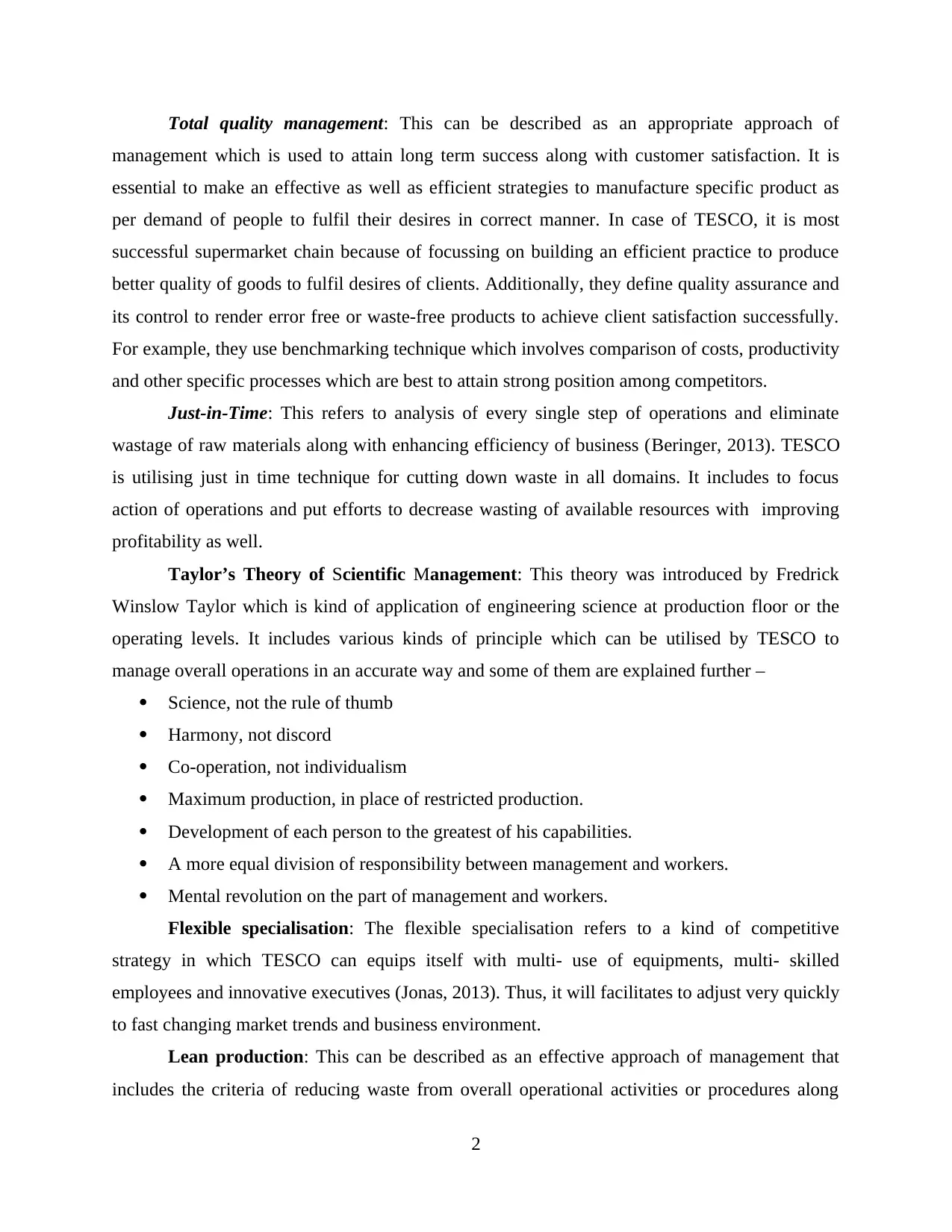
Total quality management: This can be described as an appropriate approach of
management which is used to attain long term success along with customer satisfaction. It is
essential to make an effective as well as efficient strategies to manufacture specific product as
per demand of people to fulfil their desires in correct manner. In case of TESCO, it is most
successful supermarket chain because of focussing on building an efficient practice to produce
better quality of goods to fulfil desires of clients. Additionally, they define quality assurance and
its control to render error free or waste-free products to achieve client satisfaction successfully.
For example, they use benchmarking technique which involves comparison of costs, productivity
and other specific processes which are best to attain strong position among competitors.
Just-in-Time: This refers to analysis of every single step of operations and eliminate
wastage of raw materials along with enhancing efficiency of business (Beringer, 2013). TESCO
is utilising just in time technique for cutting down waste in all domains. It includes to focus
action of operations and put efforts to decrease wasting of available resources with improving
profitability as well.
Taylor’s Theory of Scientific Management: This theory was introduced by Fredrick
Winslow Taylor which is kind of application of engineering science at production floor or the
operating levels. It includes various kinds of principle which can be utilised by TESCO to
manage overall operations in an accurate way and some of them are explained further –
Science, not the rule of thumb
Harmony, not discord
Co-operation, not individualism
Maximum production, in place of restricted production.
Development of each person to the greatest of his capabilities.
A more equal division of responsibility between management and workers.
Mental revolution on the part of management and workers.
Flexible specialisation: The flexible specialisation refers to a kind of competitive
strategy in which TESCO can equips itself with multi- use of equipments, multi- skilled
employees and innovative executives (Jonas, 2013). Thus, it will facilitates to adjust very quickly
to fast changing market trends and business environment.
Lean production: This can be described as an effective approach of management that
includes the criteria of reducing waste from overall operational activities or procedures along
2
management which is used to attain long term success along with customer satisfaction. It is
essential to make an effective as well as efficient strategies to manufacture specific product as
per demand of people to fulfil their desires in correct manner. In case of TESCO, it is most
successful supermarket chain because of focussing on building an efficient practice to produce
better quality of goods to fulfil desires of clients. Additionally, they define quality assurance and
its control to render error free or waste-free products to achieve client satisfaction successfully.
For example, they use benchmarking technique which involves comparison of costs, productivity
and other specific processes which are best to attain strong position among competitors.
Just-in-Time: This refers to analysis of every single step of operations and eliminate
wastage of raw materials along with enhancing efficiency of business (Beringer, 2013). TESCO
is utilising just in time technique for cutting down waste in all domains. It includes to focus
action of operations and put efforts to decrease wasting of available resources with improving
profitability as well.
Taylor’s Theory of Scientific Management: This theory was introduced by Fredrick
Winslow Taylor which is kind of application of engineering science at production floor or the
operating levels. It includes various kinds of principle which can be utilised by TESCO to
manage overall operations in an accurate way and some of them are explained further –
Science, not the rule of thumb
Harmony, not discord
Co-operation, not individualism
Maximum production, in place of restricted production.
Development of each person to the greatest of his capabilities.
A more equal division of responsibility between management and workers.
Mental revolution on the part of management and workers.
Flexible specialisation: The flexible specialisation refers to a kind of competitive
strategy in which TESCO can equips itself with multi- use of equipments, multi- skilled
employees and innovative executives (Jonas, 2013). Thus, it will facilitates to adjust very quickly
to fast changing market trends and business environment.
Lean production: This can be described as an effective approach of management that
includes the criteria of reducing waste from overall operational activities or procedures along
2
Paraphrase This Document
Need a fresh take? Get an instant paraphrase of this document with our AI Paraphraser
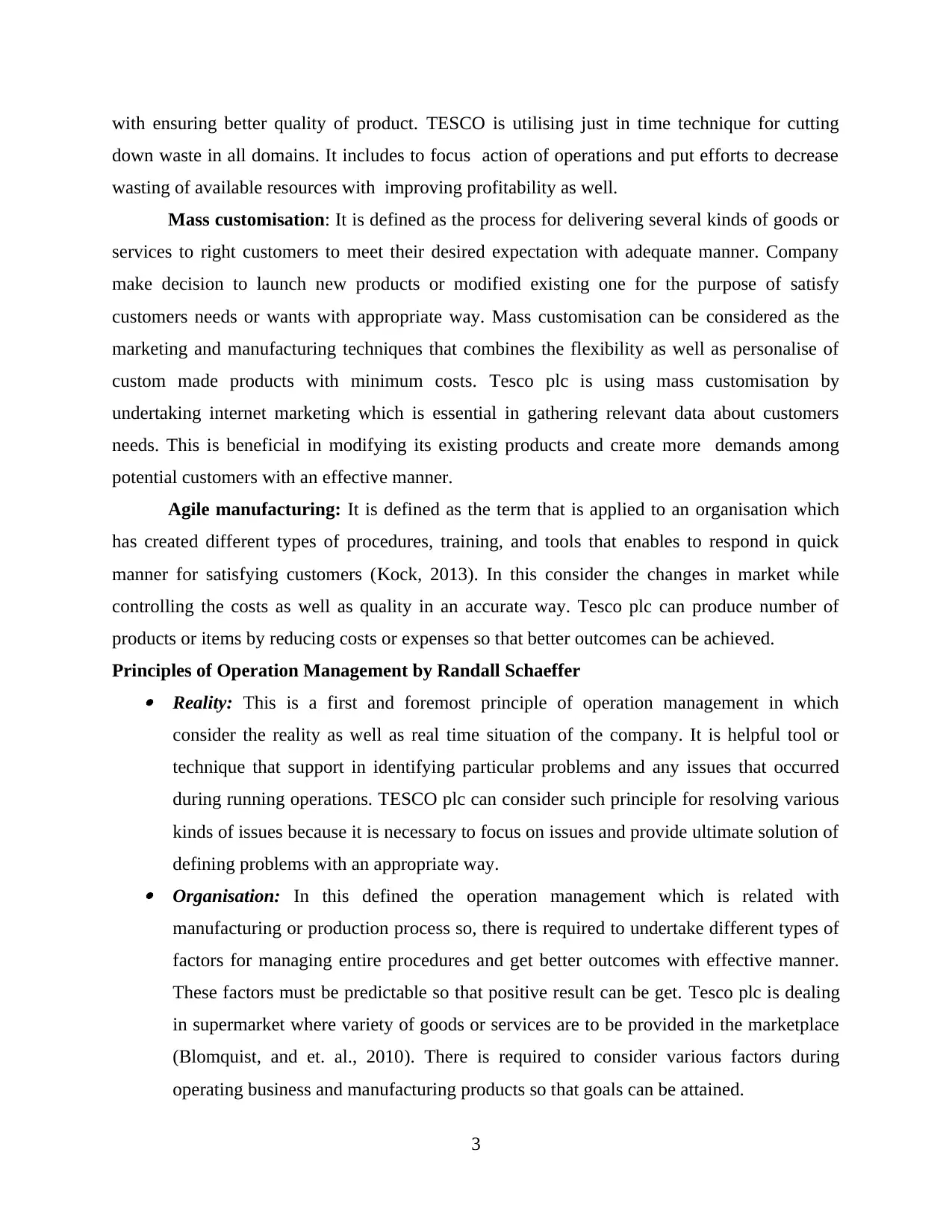
with ensuring better quality of product. TESCO is utilising just in time technique for cutting
down waste in all domains. It includes to focus action of operations and put efforts to decrease
wasting of available resources with improving profitability as well.
Mass customisation: It is defined as the process for delivering several kinds of goods or
services to right customers to meet their desired expectation with adequate manner. Company
make decision to launch new products or modified existing one for the purpose of satisfy
customers needs or wants with appropriate way. Mass customisation can be considered as the
marketing and manufacturing techniques that combines the flexibility as well as personalise of
custom made products with minimum costs. Tesco plc is using mass customisation by
undertaking internet marketing which is essential in gathering relevant data about customers
needs. This is beneficial in modifying its existing products and create more demands among
potential customers with an effective manner.
Agile manufacturing: It is defined as the term that is applied to an organisation which
has created different types of procedures, training, and tools that enables to respond in quick
manner for satisfying customers (Kock, 2013). In this consider the changes in market while
controlling the costs as well as quality in an accurate way. Tesco plc can produce number of
products or items by reducing costs or expenses so that better outcomes can be achieved.
Principles of Operation Management by Randall Schaeffer Reality: This is a first and foremost principle of operation management in which
consider the reality as well as real time situation of the company. It is helpful tool or
technique that support in identifying particular problems and any issues that occurred
during running operations. TESCO plc can consider such principle for resolving various
kinds of issues because it is necessary to focus on issues and provide ultimate solution of
defining problems with an appropriate way. Organisation: In this defined the operation management which is related with
manufacturing or production process so, there is required to undertake different types of
factors for managing entire procedures and get better outcomes with effective manner.
These factors must be predictable so that positive result can be get. Tesco plc is dealing
in supermarket where variety of goods or services are to be provided in the marketplace
(Blomquist, and et. al., 2010). There is required to consider various factors during
operating business and manufacturing products so that goals can be attained.
3
down waste in all domains. It includes to focus action of operations and put efforts to decrease
wasting of available resources with improving profitability as well.
Mass customisation: It is defined as the process for delivering several kinds of goods or
services to right customers to meet their desired expectation with adequate manner. Company
make decision to launch new products or modified existing one for the purpose of satisfy
customers needs or wants with appropriate way. Mass customisation can be considered as the
marketing and manufacturing techniques that combines the flexibility as well as personalise of
custom made products with minimum costs. Tesco plc is using mass customisation by
undertaking internet marketing which is essential in gathering relevant data about customers
needs. This is beneficial in modifying its existing products and create more demands among
potential customers with an effective manner.
Agile manufacturing: It is defined as the term that is applied to an organisation which
has created different types of procedures, training, and tools that enables to respond in quick
manner for satisfying customers (Kock, 2013). In this consider the changes in market while
controlling the costs as well as quality in an accurate way. Tesco plc can produce number of
products or items by reducing costs or expenses so that better outcomes can be achieved.
Principles of Operation Management by Randall Schaeffer Reality: This is a first and foremost principle of operation management in which
consider the reality as well as real time situation of the company. It is helpful tool or
technique that support in identifying particular problems and any issues that occurred
during running operations. TESCO plc can consider such principle for resolving various
kinds of issues because it is necessary to focus on issues and provide ultimate solution of
defining problems with an appropriate way. Organisation: In this defined the operation management which is related with
manufacturing or production process so, there is required to undertake different types of
factors for managing entire procedures and get better outcomes with effective manner.
These factors must be predictable so that positive result can be get. Tesco plc is dealing
in supermarket where variety of goods or services are to be provided in the marketplace
(Blomquist, and et. al., 2010). There is required to consider various factors during
operating business and manufacturing products so that goals can be attained.
3
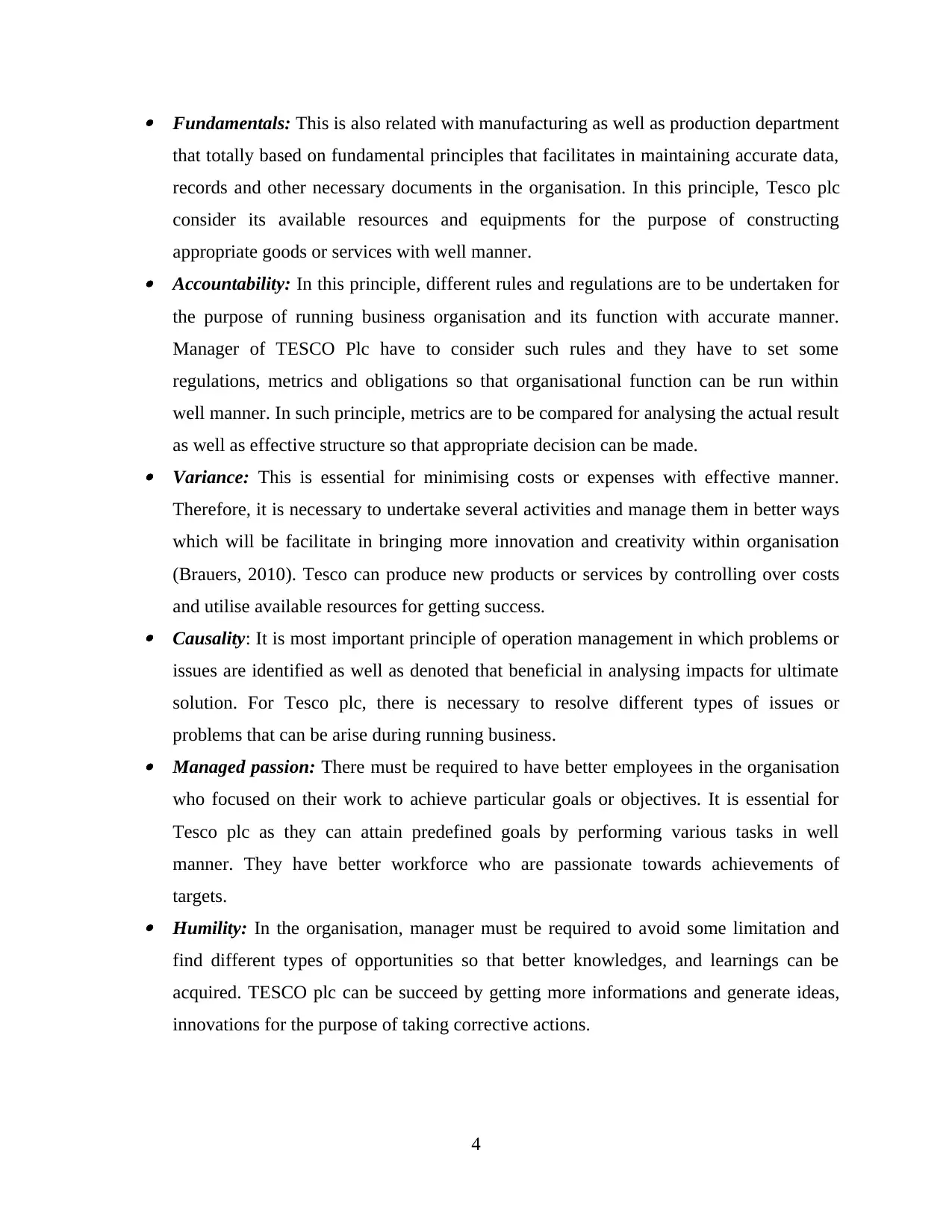
Fundamentals: This is also related with manufacturing as well as production department
that totally based on fundamental principles that facilitates in maintaining accurate data,
records and other necessary documents in the organisation. In this principle, Tesco plc
consider its available resources and equipments for the purpose of constructing
appropriate goods or services with well manner. Accountability: In this principle, different rules and regulations are to be undertaken for
the purpose of running business organisation and its function with accurate manner.
Manager of TESCO Plc have to consider such rules and they have to set some
regulations, metrics and obligations so that organisational function can be run within
well manner. In such principle, metrics are to be compared for analysing the actual result
as well as effective structure so that appropriate decision can be made. Variance: This is essential for minimising costs or expenses with effective manner.
Therefore, it is necessary to undertake several activities and manage them in better ways
which will be facilitate in bringing more innovation and creativity within organisation
(Brauers, 2010). Tesco can produce new products or services by controlling over costs
and utilise available resources for getting success. Causality: It is most important principle of operation management in which problems or
issues are identified as well as denoted that beneficial in analysing impacts for ultimate
solution. For Tesco plc, there is necessary to resolve different types of issues or
problems that can be arise during running business. Managed passion: There must be required to have better employees in the organisation
who focused on their work to achieve particular goals or objectives. It is essential for
Tesco plc as they can attain predefined goals by performing various tasks in well
manner. They have better workforce who are passionate towards achievements of
targets. Humility: In the organisation, manager must be required to avoid some limitation and
find different types of opportunities so that better knowledges, and learnings can be
acquired. TESCO plc can be succeed by getting more informations and generate ideas,
innovations for the purpose of taking corrective actions.
4
that totally based on fundamental principles that facilitates in maintaining accurate data,
records and other necessary documents in the organisation. In this principle, Tesco plc
consider its available resources and equipments for the purpose of constructing
appropriate goods or services with well manner. Accountability: In this principle, different rules and regulations are to be undertaken for
the purpose of running business organisation and its function with accurate manner.
Manager of TESCO Plc have to consider such rules and they have to set some
regulations, metrics and obligations so that organisational function can be run within
well manner. In such principle, metrics are to be compared for analysing the actual result
as well as effective structure so that appropriate decision can be made. Variance: This is essential for minimising costs or expenses with effective manner.
Therefore, it is necessary to undertake several activities and manage them in better ways
which will be facilitate in bringing more innovation and creativity within organisation
(Brauers, 2010). Tesco can produce new products or services by controlling over costs
and utilise available resources for getting success. Causality: It is most important principle of operation management in which problems or
issues are identified as well as denoted that beneficial in analysing impacts for ultimate
solution. For Tesco plc, there is necessary to resolve different types of issues or
problems that can be arise during running business. Managed passion: There must be required to have better employees in the organisation
who focused on their work to achieve particular goals or objectives. It is essential for
Tesco plc as they can attain predefined goals by performing various tasks in well
manner. They have better workforce who are passionate towards achievements of
targets. Humility: In the organisation, manager must be required to avoid some limitation and
find different types of opportunities so that better knowledges, and learnings can be
acquired. TESCO plc can be succeed by getting more informations and generate ideas,
innovations for the purpose of taking corrective actions.
4
⊘ This is a preview!⊘
Do you want full access?
Subscribe today to unlock all pages.

Trusted by 1+ million students worldwide
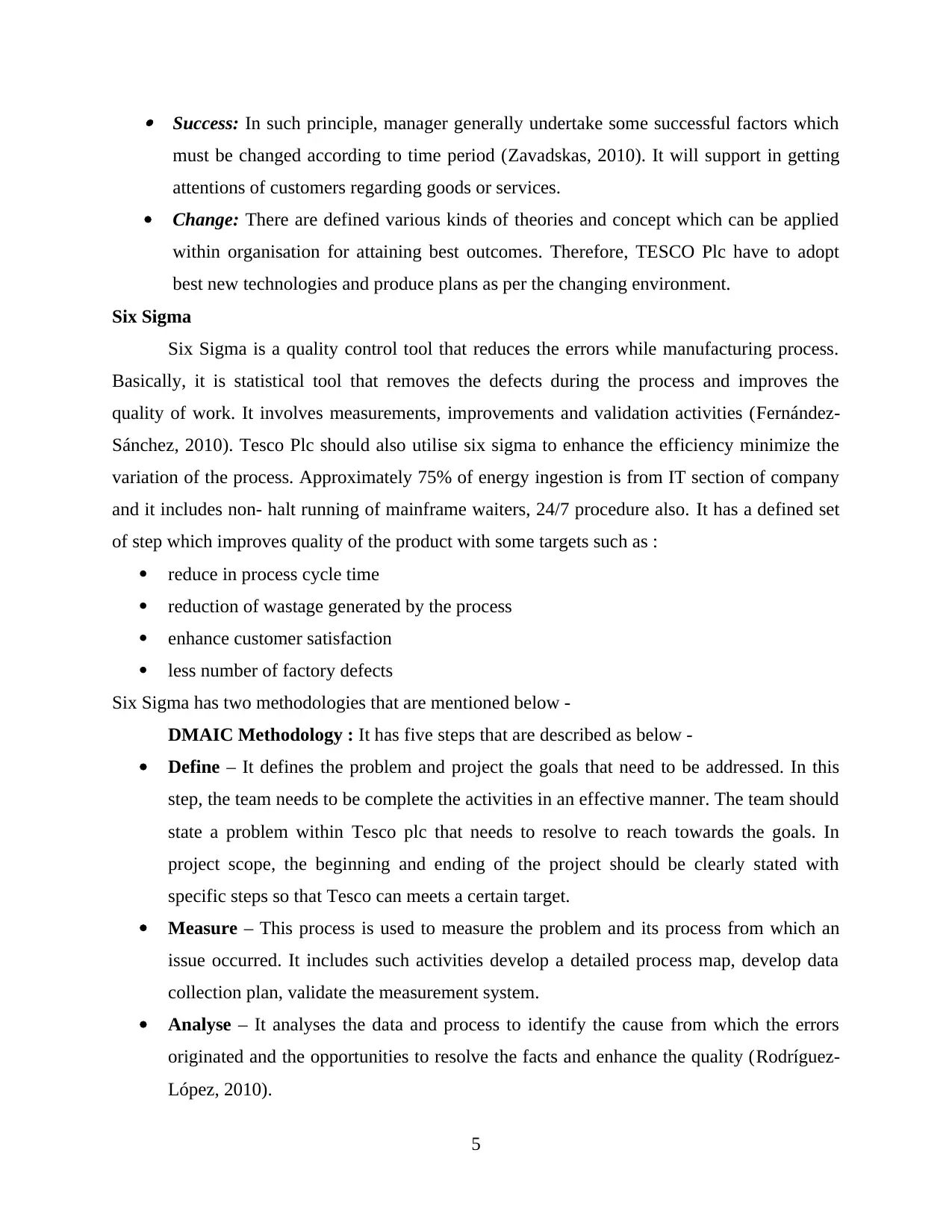
Success: In such principle, manager generally undertake some successful factors which
must be changed according to time period (Zavadskas, 2010). It will support in getting
attentions of customers regarding goods or services.
Change: There are defined various kinds of theories and concept which can be applied
within organisation for attaining best outcomes. Therefore, TESCO Plc have to adopt
best new technologies and produce plans as per the changing environment.
Six Sigma
Six Sigma is a quality control tool that reduces the errors while manufacturing process.
Basically, it is statistical tool that removes the defects during the process and improves the
quality of work. It involves measurements, improvements and validation activities (Fernández-
Sánchez, 2010). Tesco Plc should also utilise six sigma to enhance the efficiency minimize the
variation of the process. Approximately 75% of energy ingestion is from IT section of company
and it includes non- halt running of mainframe waiters, 24/7 procedure also. It has a defined set
of step which improves quality of the product with some targets such as :
reduce in process cycle time
reduction of wastage generated by the process
enhance customer satisfaction
less number of factory defects
Six Sigma has two methodologies that are mentioned below -
DMAIC Methodology : It has five steps that are described as below -
Define – It defines the problem and project the goals that need to be addressed. In this
step, the team needs to be complete the activities in an effective manner. The team should
state a problem within Tesco plc that needs to resolve to reach towards the goals. In
project scope, the beginning and ending of the project should be clearly stated with
specific steps so that Tesco can meets a certain target.
Measure – This process is used to measure the problem and its process from which an
issue occurred. It includes such activities develop a detailed process map, develop data
collection plan, validate the measurement system.
Analyse – It analyses the data and process to identify the cause from which the errors
originated and the opportunities to resolve the facts and enhance the quality (Rodríguez-
López, 2010).
5
must be changed according to time period (Zavadskas, 2010). It will support in getting
attentions of customers regarding goods or services.
Change: There are defined various kinds of theories and concept which can be applied
within organisation for attaining best outcomes. Therefore, TESCO Plc have to adopt
best new technologies and produce plans as per the changing environment.
Six Sigma
Six Sigma is a quality control tool that reduces the errors while manufacturing process.
Basically, it is statistical tool that removes the defects during the process and improves the
quality of work. It involves measurements, improvements and validation activities (Fernández-
Sánchez, 2010). Tesco Plc should also utilise six sigma to enhance the efficiency minimize the
variation of the process. Approximately 75% of energy ingestion is from IT section of company
and it includes non- halt running of mainframe waiters, 24/7 procedure also. It has a defined set
of step which improves quality of the product with some targets such as :
reduce in process cycle time
reduction of wastage generated by the process
enhance customer satisfaction
less number of factory defects
Six Sigma has two methodologies that are mentioned below -
DMAIC Methodology : It has five steps that are described as below -
Define – It defines the problem and project the goals that need to be addressed. In this
step, the team needs to be complete the activities in an effective manner. The team should
state a problem within Tesco plc that needs to resolve to reach towards the goals. In
project scope, the beginning and ending of the project should be clearly stated with
specific steps so that Tesco can meets a certain target.
Measure – This process is used to measure the problem and its process from which an
issue occurred. It includes such activities develop a detailed process map, develop data
collection plan, validate the measurement system.
Analyse – It analyses the data and process to identify the cause from which the errors
originated and the opportunities to resolve the facts and enhance the quality (Rodríguez-
López, 2010).
5
Paraphrase This Document
Need a fresh take? Get an instant paraphrase of this document with our AI Paraphraser
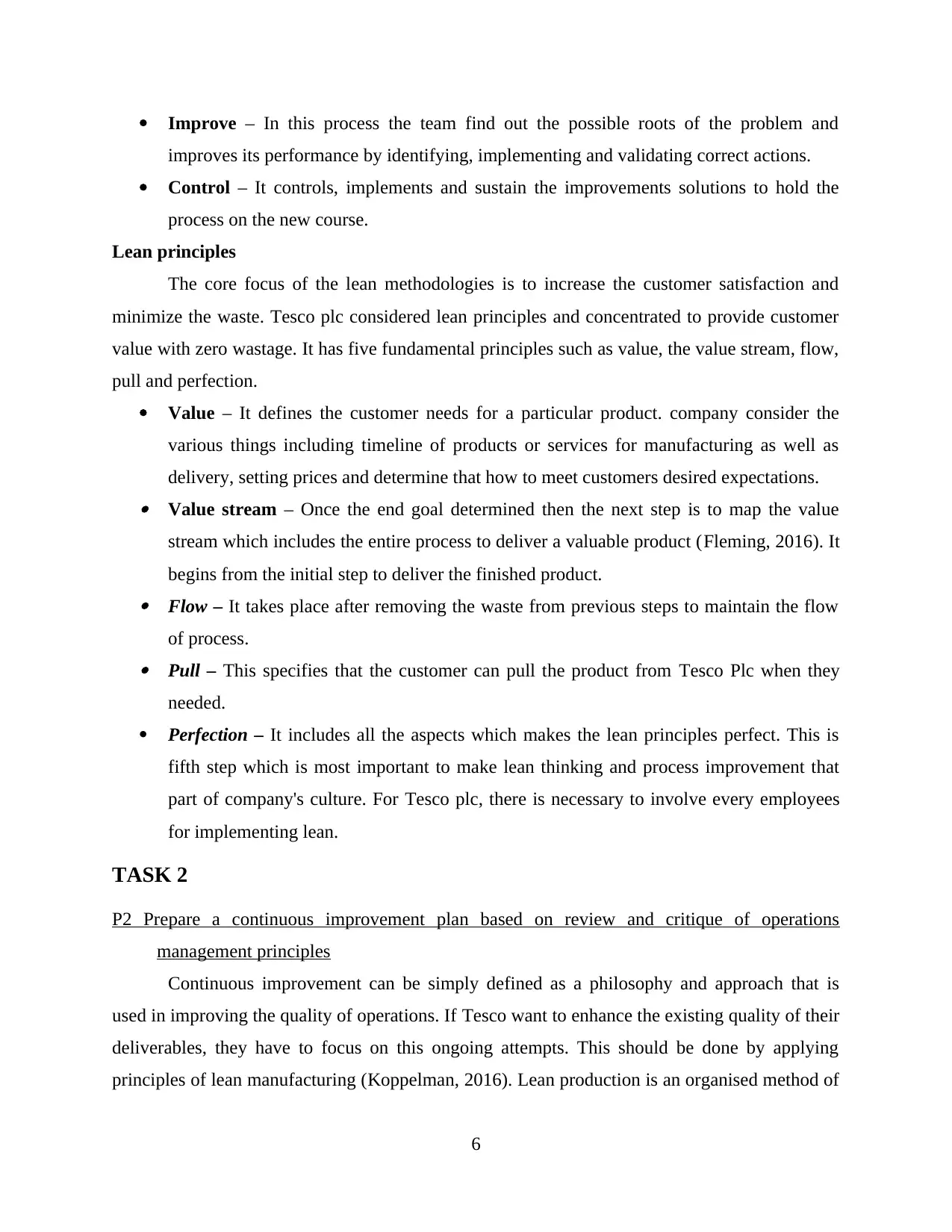
Improve – In this process the team find out the possible roots of the problem and
improves its performance by identifying, implementing and validating correct actions.
Control – It controls, implements and sustain the improvements solutions to hold the
process on the new course.
Lean principles
The core focus of the lean methodologies is to increase the customer satisfaction and
minimize the waste. Tesco plc considered lean principles and concentrated to provide customer
value with zero wastage. It has five fundamental principles such as value, the value stream, flow,
pull and perfection.
Value – It defines the customer needs for a particular product. company consider the
various things including timeline of products or services for manufacturing as well as
delivery, setting prices and determine that how to meet customers desired expectations. Value stream – Once the end goal determined then the next step is to map the value
stream which includes the entire process to deliver a valuable product (Fleming, 2016). It
begins from the initial step to deliver the finished product. Flow – It takes place after removing the waste from previous steps to maintain the flow
of process. Pull – This specifies that the customer can pull the product from Tesco Plc when they
needed.
Perfection – It includes all the aspects which makes the lean principles perfect. This is
fifth step which is most important to make lean thinking and process improvement that
part of company's culture. For Tesco plc, there is necessary to involve every employees
for implementing lean.
TASK 2
P2 Prepare a continuous improvement plan based on review and critique of operations
management principles
Continuous improvement can be simply defined as a philosophy and approach that is
used in improving the quality of operations. If Tesco want to enhance the existing quality of their
deliverables, they have to focus on this ongoing attempts. This should be done by applying
principles of lean manufacturing (Koppelman, 2016). Lean production is an organised method of
6
improves its performance by identifying, implementing and validating correct actions.
Control – It controls, implements and sustain the improvements solutions to hold the
process on the new course.
Lean principles
The core focus of the lean methodologies is to increase the customer satisfaction and
minimize the waste. Tesco plc considered lean principles and concentrated to provide customer
value with zero wastage. It has five fundamental principles such as value, the value stream, flow,
pull and perfection.
Value – It defines the customer needs for a particular product. company consider the
various things including timeline of products or services for manufacturing as well as
delivery, setting prices and determine that how to meet customers desired expectations. Value stream – Once the end goal determined then the next step is to map the value
stream which includes the entire process to deliver a valuable product (Fleming, 2016). It
begins from the initial step to deliver the finished product. Flow – It takes place after removing the waste from previous steps to maintain the flow
of process. Pull – This specifies that the customer can pull the product from Tesco Plc when they
needed.
Perfection – It includes all the aspects which makes the lean principles perfect. This is
fifth step which is most important to make lean thinking and process improvement that
part of company's culture. For Tesco plc, there is necessary to involve every employees
for implementing lean.
TASK 2
P2 Prepare a continuous improvement plan based on review and critique of operations
management principles
Continuous improvement can be simply defined as a philosophy and approach that is
used in improving the quality of operations. If Tesco want to enhance the existing quality of their
deliverables, they have to focus on this ongoing attempts. This should be done by applying
principles of lean manufacturing (Koppelman, 2016). Lean production is an organised method of
6
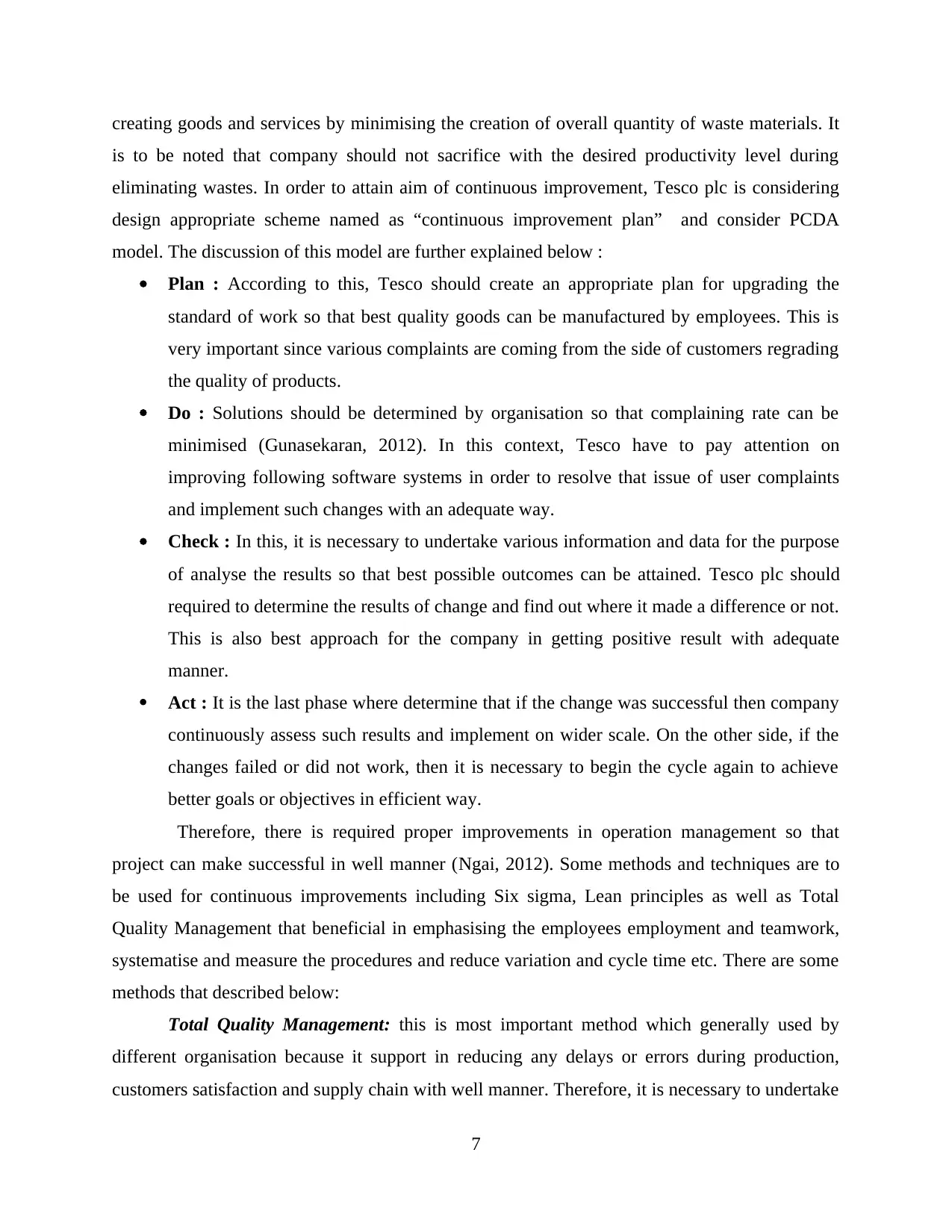
creating goods and services by minimising the creation of overall quantity of waste materials. It
is to be noted that company should not sacrifice with the desired productivity level during
eliminating wastes. In order to attain aim of continuous improvement, Tesco plc is considering
design appropriate scheme named as “continuous improvement plan” and consider PCDA
model. The discussion of this model are further explained below :
Plan : According to this, Tesco should create an appropriate plan for upgrading the
standard of work so that best quality goods can be manufactured by employees. This is
very important since various complaints are coming from the side of customers regrading
the quality of products.
Do : Solutions should be determined by organisation so that complaining rate can be
minimised (Gunasekaran, 2012). In this context, Tesco have to pay attention on
improving following software systems in order to resolve that issue of user complaints
and implement such changes with an adequate way.
Check : In this, it is necessary to undertake various information and data for the purpose
of analyse the results so that best possible outcomes can be attained. Tesco plc should
required to determine the results of change and find out where it made a difference or not.
This is also best approach for the company in getting positive result with adequate
manner.
Act : It is the last phase where determine that if the change was successful then company
continuously assess such results and implement on wider scale. On the other side, if the
changes failed or did not work, then it is necessary to begin the cycle again to achieve
better goals or objectives in efficient way.
Therefore, there is required proper improvements in operation management so that
project can make successful in well manner (Ngai, 2012). Some methods and techniques are to
be used for continuous improvements including Six sigma, Lean principles as well as Total
Quality Management that beneficial in emphasising the employees employment and teamwork,
systematise and measure the procedures and reduce variation and cycle time etc. There are some
methods that described below:
Total Quality Management: this is most important method which generally used by
different organisation because it support in reducing any delays or errors during production,
customers satisfaction and supply chain with well manner. Therefore, it is necessary to undertake
7
is to be noted that company should not sacrifice with the desired productivity level during
eliminating wastes. In order to attain aim of continuous improvement, Tesco plc is considering
design appropriate scheme named as “continuous improvement plan” and consider PCDA
model. The discussion of this model are further explained below :
Plan : According to this, Tesco should create an appropriate plan for upgrading the
standard of work so that best quality goods can be manufactured by employees. This is
very important since various complaints are coming from the side of customers regrading
the quality of products.
Do : Solutions should be determined by organisation so that complaining rate can be
minimised (Gunasekaran, 2012). In this context, Tesco have to pay attention on
improving following software systems in order to resolve that issue of user complaints
and implement such changes with an adequate way.
Check : In this, it is necessary to undertake various information and data for the purpose
of analyse the results so that best possible outcomes can be attained. Tesco plc should
required to determine the results of change and find out where it made a difference or not.
This is also best approach for the company in getting positive result with adequate
manner.
Act : It is the last phase where determine that if the change was successful then company
continuously assess such results and implement on wider scale. On the other side, if the
changes failed or did not work, then it is necessary to begin the cycle again to achieve
better goals or objectives in efficient way.
Therefore, there is required proper improvements in operation management so that
project can make successful in well manner (Ngai, 2012). Some methods and techniques are to
be used for continuous improvements including Six sigma, Lean principles as well as Total
Quality Management that beneficial in emphasising the employees employment and teamwork,
systematise and measure the procedures and reduce variation and cycle time etc. There are some
methods that described below:
Total Quality Management: this is most important method which generally used by
different organisation because it support in reducing any delays or errors during production,
customers satisfaction and supply chain with well manner. Therefore, it is necessary to undertake
7
⊘ This is a preview!⊘
Do you want full access?
Subscribe today to unlock all pages.

Trusted by 1+ million students worldwide
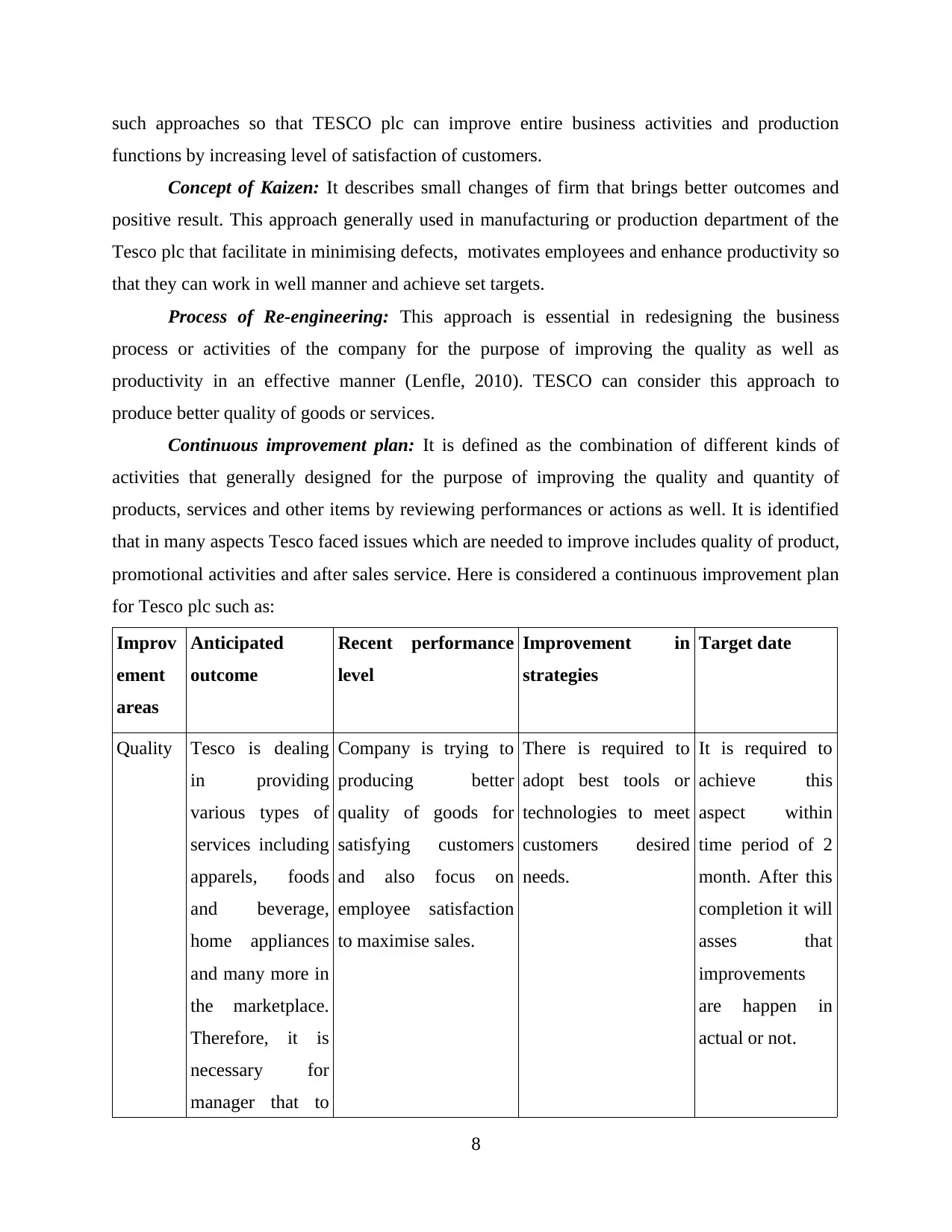
such approaches so that TESCO plc can improve entire business activities and production
functions by increasing level of satisfaction of customers.
Concept of Kaizen: It describes small changes of firm that brings better outcomes and
positive result. This approach generally used in manufacturing or production department of the
Tesco plc that facilitate in minimising defects, motivates employees and enhance productivity so
that they can work in well manner and achieve set targets.
Process of Re-engineering: This approach is essential in redesigning the business
process or activities of the company for the purpose of improving the quality as well as
productivity in an effective manner (Lenfle, 2010). TESCO can consider this approach to
produce better quality of goods or services.
Continuous improvement plan: It is defined as the combination of different kinds of
activities that generally designed for the purpose of improving the quality and quantity of
products, services and other items by reviewing performances or actions as well. It is identified
that in many aspects Tesco faced issues which are needed to improve includes quality of product,
promotional activities and after sales service. Here is considered a continuous improvement plan
for Tesco plc such as:
Improv
ement
areas
Anticipated
outcome
Recent performance
level
Improvement in
strategies
Target date
Quality Tesco is dealing
in providing
various types of
services including
apparels, foods
and beverage,
home appliances
and many more in
the marketplace.
Therefore, it is
necessary for
manager that to
Company is trying to
producing better
quality of goods for
satisfying customers
and also focus on
employee satisfaction
to maximise sales.
There is required to
adopt best tools or
technologies to meet
customers desired
needs.
It is required to
achieve this
aspect within
time period of 2
month. After this
completion it will
asses that
improvements
are happen in
actual or not.
8
functions by increasing level of satisfaction of customers.
Concept of Kaizen: It describes small changes of firm that brings better outcomes and
positive result. This approach generally used in manufacturing or production department of the
Tesco plc that facilitate in minimising defects, motivates employees and enhance productivity so
that they can work in well manner and achieve set targets.
Process of Re-engineering: This approach is essential in redesigning the business
process or activities of the company for the purpose of improving the quality as well as
productivity in an effective manner (Lenfle, 2010). TESCO can consider this approach to
produce better quality of goods or services.
Continuous improvement plan: It is defined as the combination of different kinds of
activities that generally designed for the purpose of improving the quality and quantity of
products, services and other items by reviewing performances or actions as well. It is identified
that in many aspects Tesco faced issues which are needed to improve includes quality of product,
promotional activities and after sales service. Here is considered a continuous improvement plan
for Tesco plc such as:
Improv
ement
areas
Anticipated
outcome
Recent performance
level
Improvement in
strategies
Target date
Quality Tesco is dealing
in providing
various types of
services including
apparels, foods
and beverage,
home appliances
and many more in
the marketplace.
Therefore, it is
necessary for
manager that to
Company is trying to
producing better
quality of goods for
satisfying customers
and also focus on
employee satisfaction
to maximise sales.
There is required to
adopt best tools or
technologies to meet
customers desired
needs.
It is required to
achieve this
aspect within
time period of 2
month. After this
completion it will
asses that
improvements
are happen in
actual or not.
8
Paraphrase This Document
Need a fresh take? Get an instant paraphrase of this document with our AI Paraphraser
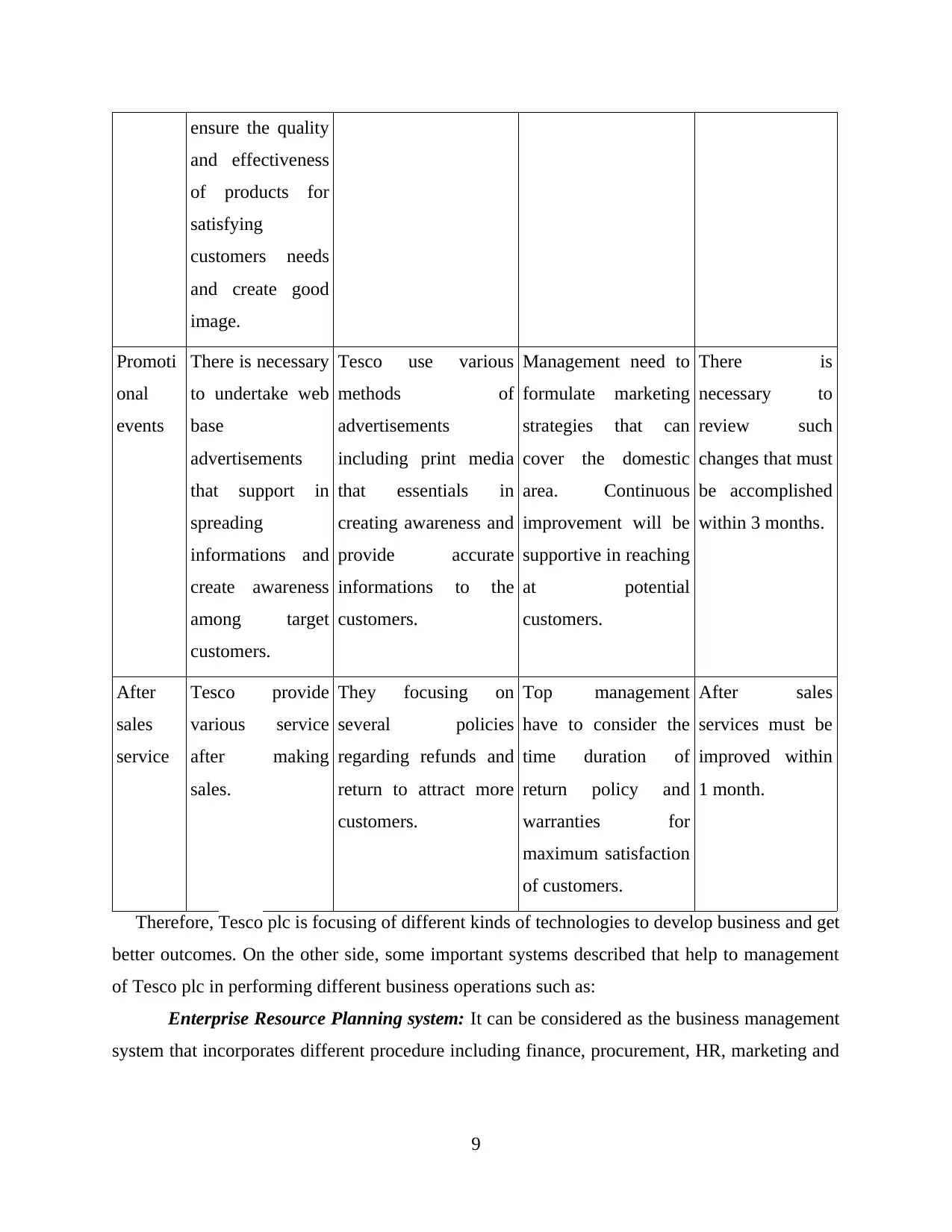
ensure the quality
and effectiveness
of products for
satisfying
customers needs
and create good
image.
Promoti
onal
events
There is necessary
to undertake web
base
advertisements
that support in
spreading
informations and
create awareness
among target
customers.
Tesco use various
methods of
advertisements
including print media
that essentials in
creating awareness and
provide accurate
informations to the
customers.
Management need to
formulate marketing
strategies that can
cover the domestic
area. Continuous
improvement will be
supportive in reaching
at potential
customers.
There is
necessary to
review such
changes that must
be accomplished
within 3 months.
After
sales
service
Tesco provide
various service
after making
sales.
They focusing on
several policies
regarding refunds and
return to attract more
customers.
Top management
have to consider the
time duration of
return policy and
warranties for
maximum satisfaction
of customers.
After sales
services must be
improved within
1 month.
Therefore, Tesco plc is focusing of different kinds of technologies to develop business and get
better outcomes. On the other side, some important systems described that help to management
of Tesco plc in performing different business operations such as:
Enterprise Resource Planning system: It can be considered as the business management
system that incorporates different procedure including finance, procurement, HR, marketing and
9
and effectiveness
of products for
satisfying
customers needs
and create good
image.
Promoti
onal
events
There is necessary
to undertake web
base
advertisements
that support in
spreading
informations and
create awareness
among target
customers.
Tesco use various
methods of
advertisements
including print media
that essentials in
creating awareness and
provide accurate
informations to the
customers.
Management need to
formulate marketing
strategies that can
cover the domestic
area. Continuous
improvement will be
supportive in reaching
at potential
customers.
There is
necessary to
review such
changes that must
be accomplished
within 3 months.
After
sales
service
Tesco provide
various service
after making
sales.
They focusing on
several policies
regarding refunds and
return to attract more
customers.
Top management
have to consider the
time duration of
return policy and
warranties for
maximum satisfaction
of customers.
After sales
services must be
improved within
1 month.
Therefore, Tesco plc is focusing of different kinds of technologies to develop business and get
better outcomes. On the other side, some important systems described that help to management
of Tesco plc in performing different business operations such as:
Enterprise Resource Planning system: It can be considered as the business management
system that incorporates different procedure including finance, procurement, HR, marketing and
9
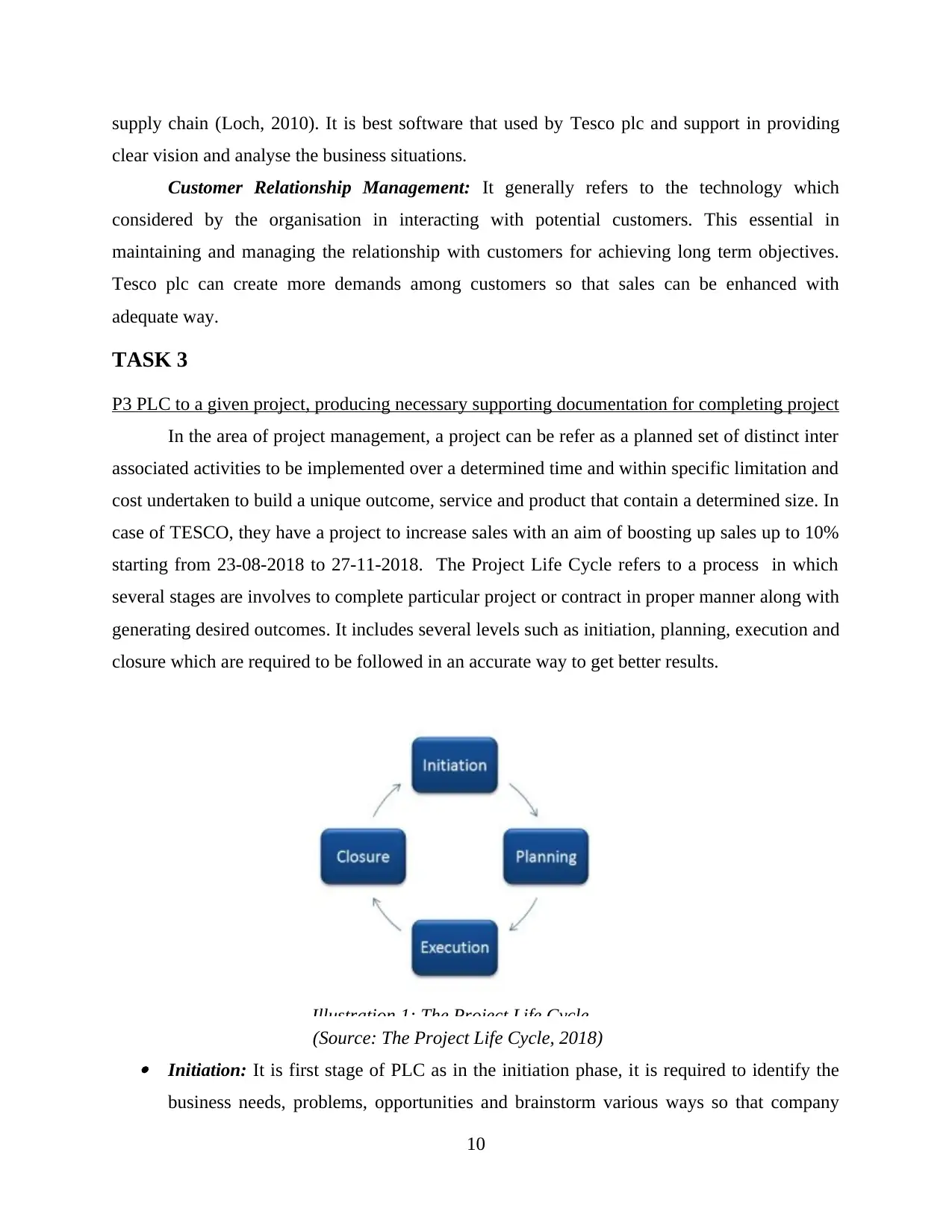
supply chain (Loch, 2010). It is best software that used by Tesco plc and support in providing
clear vision and analyse the business situations.
Customer Relationship Management: It generally refers to the technology which
considered by the organisation in interacting with potential customers. This essential in
maintaining and managing the relationship with customers for achieving long term objectives.
Tesco plc can create more demands among customers so that sales can be enhanced with
adequate way.
TASK 3
P3 PLC to a given project, producing necessary supporting documentation for completing project
In the area of project management, a project can be refer as a planned set of distinct inter
associated activities to be implemented over a determined time and within specific limitation and
cost undertaken to build a unique outcome, service and product that contain a determined size. In
case of TESCO, they have a project to increase sales with an aim of boosting up sales up to 10%
starting from 23-08-2018 to 27-11-2018. The Project Life Cycle refers to a process in which
several stages are involves to complete particular project or contract in proper manner along with
generating desired outcomes. It includes several levels such as initiation, planning, execution and
closure which are required to be followed in an accurate way to get better results.
(Source: The Project Life Cycle, 2018) Initiation: It is first stage of PLC as in the initiation phase, it is required to identify the
business needs, problems, opportunities and brainstorm various ways so that company
10
Illustration 1: The Project Life Cycle
clear vision and analyse the business situations.
Customer Relationship Management: It generally refers to the technology which
considered by the organisation in interacting with potential customers. This essential in
maintaining and managing the relationship with customers for achieving long term objectives.
Tesco plc can create more demands among customers so that sales can be enhanced with
adequate way.
TASK 3
P3 PLC to a given project, producing necessary supporting documentation for completing project
In the area of project management, a project can be refer as a planned set of distinct inter
associated activities to be implemented over a determined time and within specific limitation and
cost undertaken to build a unique outcome, service and product that contain a determined size. In
case of TESCO, they have a project to increase sales with an aim of boosting up sales up to 10%
starting from 23-08-2018 to 27-11-2018. The Project Life Cycle refers to a process in which
several stages are involves to complete particular project or contract in proper manner along with
generating desired outcomes. It includes several levels such as initiation, planning, execution and
closure which are required to be followed in an accurate way to get better results.
(Source: The Project Life Cycle, 2018) Initiation: It is first stage of PLC as in the initiation phase, it is required to identify the
business needs, problems, opportunities and brainstorm various ways so that company
10
Illustration 1: The Project Life Cycle
⊘ This is a preview!⊘
Do you want full access?
Subscribe today to unlock all pages.

Trusted by 1+ million students worldwide
1 out of 19
Related Documents
Your All-in-One AI-Powered Toolkit for Academic Success.
+13062052269
info@desklib.com
Available 24*7 on WhatsApp / Email
![[object Object]](/_next/static/media/star-bottom.7253800d.svg)
Unlock your academic potential
Copyright © 2020–2026 A2Z Services. All Rights Reserved. Developed and managed by ZUCOL.





